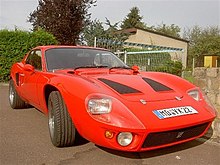Fiberfab FT Bonito
The Fiberfab FT Bonito is a German kit vehicle from the 1970s with a plastic body and a sporty appearance. The manufacturer was Fiberfab body .
history
The manufacturer presented the Fiberfab Bonito to the public for the first time in September 1969 at the Frankfurt IAA . The car was a formally well done 2 + 2-seater sports coupé with a flat front section, low belt line and angular demolition rear on the chassis and with the engine of the VW Beetle . The appearance of the Bonito corresponded to the common ideas of a classy sports car of that time.
Fiberfab offered the Bonito exclusively as a kit car , as a DIY kit. Only the sample vehicles were built ready to drive. Normally the Bonito kits were transported by train, in large wooden boxes specially made for this purpose. However, many customers also picked up their Bonito kit themselves. A VW pickup truck or an open car trailer were sufficient for this.
According to company boss Jörgfrieder Kuhnle, Fiberfab produced more than 1000 Bonito kits during its ten-year construction period. According to information from "Bonito & KitCar IG Germany", there are still around 100 VW Beetles with Bonito bodies in Germany alone. Not even half of them are still roadworthy or have a road approval.
In 1978, a year before Bonito production was phased out, the kit cost 4,490.00 marks; Added to this were a number of accessories, packaging and shipping costs and VAT.
Kit
The body made of glass fiber reinforced plastic was manufactured by hand at Fiberfab using an injection molding process. A body could be manufactured every working day, because the mixture of glass threads and polyester resin took a good day to dry out before it could be lifted out of the negative mold for further processing.
The Bonito kit contained the primed bodyshell, the two doors, the engine and trunk hood, the complete interior trim, the instrument panel, as well as the headliner and the side panels. In addition, there were other important components such as the stiffening elements for the chassis, the side windows, window and door sealing profiles, decorative strips, a detailed assembly manual with many clear detailed photos and the sample report for the TÜV.
In addition to the description for building the body, the supplied assembly instructions also contained a number of useful tips, because many parts such as the front and rear windows, lamps, taillights or indicators were not included in the scope of delivery.
Basic vehicles and large series parts
Used VW Beetles were used as the base vehicle and had to be procured by the buyer of the kit himself. After removing the Beetle body, the fully assembled Bonito body could be placed on the Beetle chassis and, as is usual with the Beetle, screwed to the floor pan. Fiberfab estimated around 100 working hours for the complete assembly. Then there was the paintwork.
Almost all Beetle components could be reused, including the engine and transmission and all the technical and electrical equipment. Ready to drive, the Fiberfab FT Bonito only weighed around 680 kilograms and was therefore around 40 kilograms lighter than the series Beetle. In the front you sat in anatomically shaped seat shells, in the rear there was only enough space for an emergency bench.
Fiberfab recommended that of the Ford 12M P6 as the windshield and that of the Opel Rekord Coupè C as the rear window . The headlights came from the Ford 15M P6 , the rear lights from Hella , the indicators from the NSU Prinz .
It was popular to install a performance-enhanced engine based on the VW Beetle or VW Type 3 and thus adapt the performance to the sporty exterior of the vehicle. With the VW series engines from 34 to 54 hp (1600 cm³ engine with D-Jetronic) the Bonito was rather scarce.
literature
- Till Look: Kit for Fun. Beetle in a model dress: Fiberfab Ft Bonito. In: Oldtimer Markt 10/2003, pp. 178–185.


